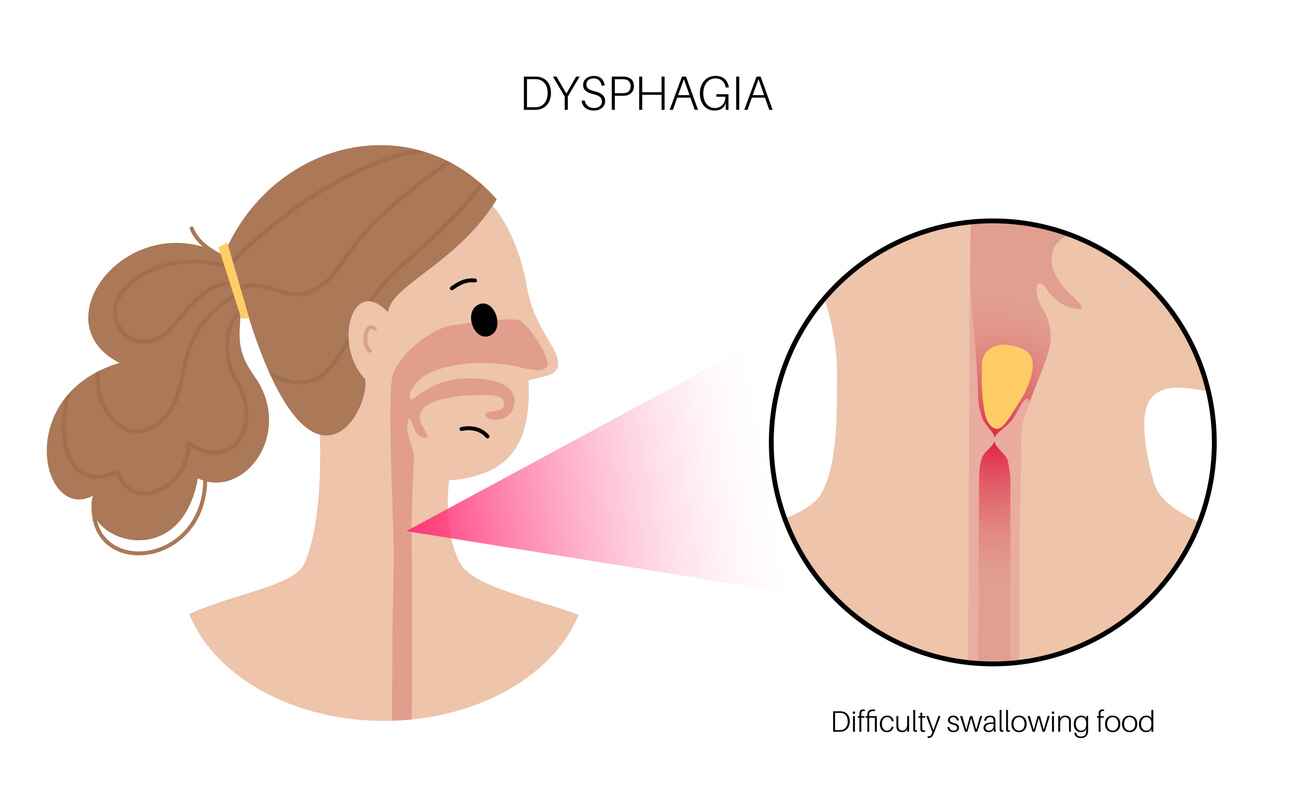
Overcoming Dysphagia: Understanding and Managing Trouble Swallowing
Dysphagia, or difficulty swallowing, can make eating challenging and affect your nutrition. This condition can come from various health issues or blockages. It can cause mild discomfort or serious health concerns.
Understanding the Complexity of Swallowing
Understanding dysphagia requires recognizing the complexity of swallowing. This process requires the brain, nerves, muscles, and two valves. They work together to move food and liquids from the mouth to the stomach. Swallowing happens in three key steps:
- Oral Phase: This first step is the only one you can control. Your tongue and the roof of your mouth keep food or liquid in place.
- Pharyngeal Phase: When your brain decides it’s time to swallow, a series of quick reflexes kick in. Food moves from your mouth into your throat. A muscle at the bottom of your throat opens, letting food enter your food pipe. At the same time, other muscles close off your airway to keep food out of your lungs. This all happens in less than half a second.
- Esophageal Phase: In the last step, food enters your esophagus, a muscular tube about 9 inches long. Coordinated muscle movements, called peristalsis, push the food down. A muscle at the end opens to let food into your stomach. This usually takes 6 to 8 seconds.
Dysphagia can happen during any of these steps, showing just how many things need to go right for a smooth swallow.

Types of Dysphagia
There are three main types of dysphagia, each affecting different parts of the swallowing process:
- Oropharyngeal Dysphagia: Difficulty initiating a swallow due to issues in the mouth or throat, often related to nerve or muscle dysfunction.
- Esophageal Dysphagia: A sensation of food getting stuck in the throat or chest caused by problems in the esophagus.
- Functional Dysphagia: Swallowing difficulties without any identifiable physical cause, often linked to stress or anxiety.
Causes of Dysphagia
Dysphagia can arise from various causes, affecting different parts of the swallowing process:
- Neurological Disorders: Conditions like a stroke, Parkinson’s disease, or multiple sclerosis that disrupt nerve signals needed for swallowing.
- Obstructions: Growths, narrowing, or foreign objects that block the food pipe or throat.
- Muscle Weakness: Diseases such as muscular dystrophy or aging-related muscle decline can make swallowing difficult.
- Gastroesophageal Reflux Disease: Stomach acid irritation can lead to scarring or narrowing of the esophagus, commonly known as GERD.
- Medication Side Effects: Certain drugs can cause dry mouth or relax the esophagus, leading to dysphagia.

Common Symptoms of Dysphagia
Common symptoms of dysphagia can vary depending on the underlying cause but typically include:
- Difficulty Swallowing: A sensation of food or liquid sticking in the throat or chest.
- Painful Swallowing: Discomfort or pain when swallowing food or drinks.\
- Coughing or Choking: Frequent coughing or choking during or after eating.
- Regurgitation: The sensation of food coming back up into the mouth or throat.
- Frequent Heartburn: A burning sensation in the chest, often due to acid reflux.
Diagnosing Dysphagia
To diagnose swallowing issues, doctors look at your symptoms, health history, and perform a physical exam. They might suggest tests like a barium swallow, where they take X-rays as you drink a special liquid to see how you swallow.
Other tests include endoscopy, which uses a thin tube with a camera to look inside your food pipe or measure muscle movements in your food pipe. These tests help find the cause of your swallowing troubles, including possible esophageal disorders, enabling the doctor to develop an effective treatment plan.
Treatment Options
Treating and managing dysphagia involves adopting strategies to minimize risk factors and maintain overall swallowing health. Effective methods include:
- Maintain a Healthy Diet: Eat a balanced diet rich in fruits, vegetables, and whole grains to support overall health and prevent nutritional deficiencies.
- Stay Hydrated: Drink plenty of fluids to keep the throat and esophagus moist, which can help ease swallowing.
- Manage Chronic Conditions: Effectively control conditions like GERD or diabetes that could contribute to swallowing difficulties.
- Avoid Tobacco and Excessive Alcohol: These substances can irritate the throat and esophagus, increasing the risk of dysphagia.
- Engage in Swallowing Exercises: Work with a speech or swallowing therapist to perform exercises that strengthen swallowing muscles and improve coordination.
Strategies for Overcoming Dysphagia
Tackling dysphagia often requires a varied approach tailored to the specific causes of the condition. Effective management usually combines medical care, lifestyle changes, and therapy. For example, treating the root cause can improve swallowing. This includes fixing a nerve disorder, clearing food pipe blockages, or controlling reflux.
Swallowing therapy with a speech expert can improve swallowing, strengthen muscles, and develop safer methods. Also, a diet change can help. Softer foods and thicker drinks can ease discomfort and prevent choking. With the right mix of medical care and therapy, many can manage or even overcome dysphagia, improving their quality of life and ability to enjoy meals.

When to Seek Help for Dysphagia
While it’s normal to have trouble swallowing occasionally, frequent or worsening symptoms shouldn’t be ignored. If you often choke, bring food back up, or notice unexplained weight loss, it might signal a more serious issue. Dysphagia that goes untreated can lead to dehydration, malnutrition, or even pneumonia if food or liquid gets into your lungs.
It’s essential to seek help early. By catching dysphagia early, doctors can treat it before it becomes a bigger problem. Even if your symptoms seem mild, it’s a good idea to talk to a specialist if swallowing issues persist. Early treatment can prevent complications and improve your ability to eat and drink comfortably.
Find Relief from Dysphagia
Dysphagia can be a challenging condition, but understanding its causes and finding the right treatment can make a big difference. If you’re having trouble swallowing or looking for ways to manage your symptoms, the Gastroenterology of Greater Orlando team is ready to help. With personalized care and advanced treatment options, we can work with you to develop a plan that fits your needs and helps you enjoy meals without discomfort.
Our experienced specialists are here to guide you every step of the way. Don’t let dysphagia hold you back. Contact us today to schedule an appointment and take the first step toward improving your swallowing and overall health.